McDonald’s, Johnson & Johnson, BrewDog: Everything that matters this morning
Good morning and welcome to Marketing Week’s round-up of the news that matters in the marketing world today.
Johnson & Johnson to end sales of talcum powder after cancer claims
Johnson & Johnson (J&J) will stop sales of its talc-based Johnson’s Baby Powder globally next year. The product has been subject to thousands of lawsuits from people alleging that it causes cancer.
The lawsuits have largely come from women who allege that the talcum powder is contaminated with asbestos and has caused them to develop ovarian cancer. Despite the decision to pull the product, J&J still strongly deny the allegations, saying independent research has shown the product to be completely safe.
The company, which also owns brands like Listerine, Aveeno and Neutrogena, says the talc-based powder will be replaced by a new corn starch-based product, adding that this is already sold in some of its markets. In 2020, J&J halted sales of talc-based powder in the US and Canada because demand had fallen amid what it called “misinformation” prompted by the spate of lawsuits.
However, the product was still sold elsewhere across the world, including in the UK.
The company has sold its baby powder since 1894. In 1999, Reuters reported that an internal marketing presentation had referred to the baby products division, with baby powder at the core, as J&J’s “#1 Asset”.
In October, J&J span off a subsidiary, LTL Management, and assigned the talc-power product to it. At the time of the spin-off, the company faced costs from $3.5bn (£2.87bn) in verdicts and settlements, including one in which 22 women were awarded a judgment of more than $2bn (£1.64bn).
When the new company was formed, it was immediately placed into bankruptcy, thus pausing the pending lawsuits. However, if the cases were allowed to continue, consumers may be able to use the fact the company has halted sales of the product as evidence against it in court.
A 2018, Reuters investigation concluded that J&J knew about carcinogens in the product for decades. Internal company records, trial testimony and other evidence showed that from at least 1971 to the early 2000s, J&J’s raw talc and finished powders sometimes tested positive for small amounts of asbestos.
READ MORE: J&J to end global sales of talc-based baby powder
UK economy shrunk by 0.1% between April and June
The UK economy shrunk by 0.1% in the second quarter of this year, according to estimates from the Office for National Statistics (ONS).
The shrinkage for June alone was even worse, with gross domestic product (GDP) falling by 0.6% during the month. However, the ONS says it is important to note the impact of the Queen’s Jubilee Bank Holiday, which led to one additional working day in May, and two less working days in June.
However, while the change to working days in June did affect the monthly estimate, the ONS says it likely had little impact on the overall quarterly figure. The first quarter of 2022 saw the economy grow by 0.8%.
The ONS says real household consumption decreased by 0.2%, which could be a sign that households are beginning to tighten their belts amid inflation. The Bank of England has already issued bleak predictions that the UK will enter recession in the last three months of this year, which is forecast to last over a year.
A recession is generally counted after two successive quarters of economic decline, meaning if this current quarter results in decline, then the UK will be in a recession.
The UK’s services sector slumped by 0.4% in Q2 2022, partly caused by the ceasing of some coronavirus related health activities, such as track and trace, says the ONS. However, it reports there were positive contributions from consumer-facing services, with travel agencies and tour operators doing particularly well.
Despite the shrinkage, the GDP figure reported today is actually better than economists had expected. The UK economy had been expected to decline by 0.2% last quarter.
McDonald’s plans to reopen some of its Ukraine restaurants
 McDonald’s has announced plans to begin a phased reopening of some of its Ukraine branches, with the aim of helping to restore a “small but important sense of normalcy”.
McDonald’s has announced plans to begin a phased reopening of some of its Ukraine branches, with the aim of helping to restore a “small but important sense of normalcy”.
The fast-food chain closed its more than 100 restaurants in Ukraine in March after Russia invaded the country. It will now reopen some of these branches in Kyiv and areas of Western Ukraine which are deemed safe.
The company has continued to pay wages to more than 10,000 staff during the closures.
The International Monetary Fund (IMF) predicts the war in Ukraine will lead to a 35% shrinkage in its economy this year.
Ukrainian officials have advised the reopening of businesses in the country will help support the economy during the war, says McDonald’s vice-president Paul Pomroy.
“We’ve spoken extensively to our employees who have expressed a strong desire to return to work and see our restaurants in Ukraine reopen, where it is safe and responsible to do so,” he writes, in a statement on the company’s website
The business added it is working with its suppliers and contractors to ensure its restaurants are ready for reopening.
Other western brands, including KFC, Nike and Mango have reopened in Kyiv recently, having initially closed at the beginning of the invasion.
In May, McDonald’s sold most of its restaurants in Russia to a local licensee, having suspended operations in the country in March.
READ MORE: McDonald’s plans to reopen in Kyiv and western Ukraine
Superdrug and Savers pledge to create 25,000 jobs for 16- to 23-year-olds by 2025
Superdrug and Savers have pledged to create 25,000 jobs for young people aged 16 to 23 in the UK by 2025.
The pledge comes as part of a wider commitment from parent company A.S. Watson to create 200,000 jobs for young people globally. The beauty and health company operates in 27 markets, and owns brands like The Perfume Shop and flagship drugstore brand Watsons, as well as Superdrug and Savers.
The effort to encourage youth employment comes after the difficult period of the pandemic and aims to equip young people with essential skills to prepare them for a job in the retail sector. The business cites research from the International Labour Organisation, which found that youth unemployment had increased by 8.7% during the pandemic.
A.S. Watson has also pledged to invest in upskilling the younger generation. It has committed to providing 5 million global training and coaching hours to upskill the younger generation for a future in “O+O” (offline plus online) by 2030 from training sessions to on-the-job coaching.
“We understand healthy business is only possible with a healthy society and believe that decisive action is needed to build a society that nurtures talent, embraces diversity, and improves livelihoods,” says Superdrug and Savers people director Amy Davies.
“Our pledge will create a better, stronger business; ready for the huge societal changes we are experiencing today.”
BrewDog launches cross-channel subscription service
 BrewDog is launching a new cross-channel subscription that will give members money and discounts to spend both in bars and online.
BrewDog is launching a new cross-channel subscription that will give members money and discounts to spend both in bars and online.
The ‘BrewDog Plus’ subscription costs £99 per month and will give members £150 to spend in BrewDog bars, as well as free delivery and one free Grind coffee every day from a BrewDog bar.
The scheme also includes access to Planet BrewDog, the beer brand’s loyalty scheme which claims to benefit the environment as well as members. Members are able to earn points and gain access to discounts through the scheme.
BrewDog CEO and founder James Watt called the initiative “ground-breaking” in a post announcing it on LinkedIn.
The company already has a subscription service, which takes the form of a monthly box containing eight beers. The new subscription is the first to span BrewDog’s bar and online businesses.
The beer brand was founded in 2007, by two friends James Watt and Martin Dickie, with the intention of disrupting the beer industry. But BrewDog saw damage to its brand last June, when a group of former employees banded together as ‘Punks with Purpose’ to shed light on the company’s work practices.
In the six months after the crisis, the brand saw its reputation score, a measure judging whether you’d want to work at a company, dip by over seven points. The decline was described as statistically significant” by YouGov.
Thursday, 11 August
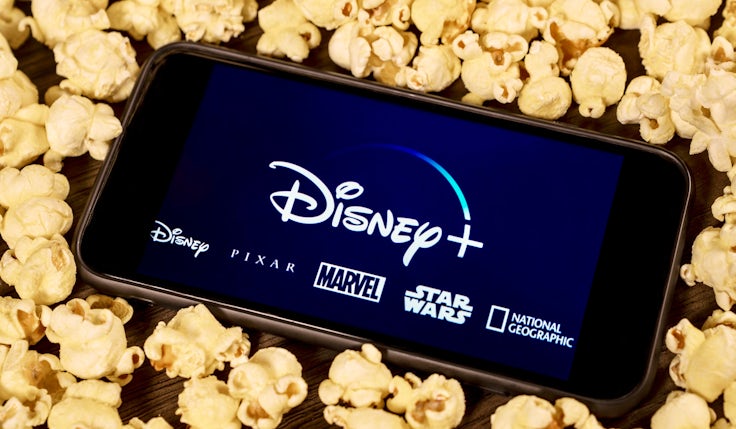
Disney+ reveals price of ad-supported tier
Disney+ has announced plans to launch its ad-supported tier in the US on 8 December this year, as the Walt Disney Company edged past Netflix on subscribers over its most recent quarter.
The ad-supported tier will cost viewers $7.99 per month (£6.53), equal to the current price of a Disney+ subscription without ads. The existing no-ads tier will increase in price to $10.99 (£9.01) per month, or $109.99 (£90.13) for a year.
Disney will also offer US consumers various bundles with access to its jointly owned Hulu and ESPN+ streaming services, with a bundle including all three to cost viewers $12.99 per month (£10.64) with ads.
“With our new ad-supported Disney+ offering and an expanded line up of plans across our entire streaming portfolio, we will be providing greater consumer choice at a variety of price points to cater to the diverse needs of our viewers and appeal to an even broader audience,” says Kareem Daniel, chairman of Disney Media and Entertainment Distribution.
Combining Disney+, Hulu and ESPN+, Walt Disney now claims a total of 221 million streaming subscribers, having added 14.4 million Disney+ customers over the last quarter. This was well above analysts’ expectations of 10 million.
Meanwhile, Netflix claims 220.7 million streaming subscribers, having announced the loss of 1 million subscribers last month. Netflix is also planning to launch an ad-supported streaming option.
However, Disney is still haemorrhaging money through its streaming effort, reporting a loss of $1.1bn (£901m) for the quarter. The media and entertainment unit as a whole therefore saw profits drop 32% to nearly $1.4bn (£1.1bn).
British Gas’s brand health worsens as profits swell
Parent company Centrica may have reported a five-fold increase in its operating profits last month, but the health of the British Gas brand is in long-term decline as customers struggle with the worsening energy crisis, new data reveals.
According to YouGov’s BrandIndex tool, British Gas’s index score – a measure of overall brand health – among its own customers plummeted 16 points between 1 January and 1 August this year, from a score of 17.9 to 1.9.
The energy brand fares no better among the public as a whole, with its score dropping from a neutral 0.0 to -9.3 over the same period.
Customers’ impression of the brand, a measure of overall sentiment, has fallen from a score of 23.4 to 10.5, while among the wider public the score has dropped from a slightly negative -0.7 to a firmly negative -10.1.
Value for money perceptions have also worsened among customers, despite a low starting point. British Gas’s score has slid an enormous 19.6 points downwards, from -3 to -22.6. For the public, the score has dropped from -12.4 to -25.2.
No wonder then that overall satisfaction among British Gas customers has collapsed from a strong score of 31.9 to just 10.2.
Earlier this week, consultancy Cornwall Insight forecast that annual energy bills will exceed £4,200 from January, and could rise as far as £4,426 in April. Consumer champion Martin Lewis has urged the government to develop an immediate action plan to support struggling households.
Meanwhile, in July Centrica reported operating profits of £1.34bn for the first half of 2022, up from £262m over the same period last year.
Yet, according to analysis conducted by Marketing Week earlier this year, British Gas isn’t the only energy firm to be taking a beating to its brand health. All of the ‘Big Six’ companies, plus up-and-comer Octopus Energy, have seen their index scores fall significantly since July last year, when energy companies first began to go bust amid soaring wholesale prices.
Boots Opticians repositions brand with new platform
Boots Opticians is repositioning its brand with the launch of a new platform and through-the-line campaign, as the optician aims to “inspire” people to prioritise their eye health and demonstrate how it can support their needs.
The platform asks consumers to ‘See what’s possible by opening your eyes to what’s out there when you have sharper vision’, with a less wordy version shortened to ‘See what’s possible’. The campaign launches on TV today (10 August), with supporting activity to run across video-on-demand (VOD), digital out-of-home, social media and digital display.
Filmed from a first-person perspective, the 30-second ad shows a series of scenes that demonstrate the “amazing” moments clear sight enables, from seeing the Northern Lights for the first time, to driving in new places, to going for an early morning run in a foggy forest.
“We regularly receive feedback from our customers that their lives open up for them and they are able to truly embrace the moments that matter by having clear sight. This demonstrates the important role that each and every one of our colleagues and partners play by helping our customers have clearer vision,” says managing director James Arrow.
“This new brand identity sets out to demonstrate how amazing those occasions can be and we look forward to welcoming more customers to Boots Opticians to help them to See What’s Possible.”
The campaign was jointly created by Boots and its cross-agency WPP team, The Pharm, as well as VMLY&R, Ogilvy PR and Mediacom.
Starling Bank to donate £1,000 to 23 women’s football clubs
Starling Bank is furthering its commitment to support women’s football after sponsoring the UEFA Women’s Euro 2022 tournament, pledging to donate £28,000 to emerging players and grassroots clubs to help develop the pipeline of talent.
Grants of £1,000 each will be donated to 23 clubs in the Euro’s nine host cities across the UK, including Brighton, Manchester, Sheffield, and Southampton. Starling has also partnered with SportsAid to identify five up-and-coming players, who have each received their own £1,000 grant to support their development.
“We sponsored the UEFA Women’s Euro because we want to lift women up wherever we can, especially in male dominated spaces like football and banking,” says chief banking officer Helen Bierton.
“The tournament might be over, but this is not the time to drop the ball – it’s time to focus on how much further football can go. We hope our donation plays a part in that.”
In May Starling launched its ‘Our Time’ campaign, highlighting the glass ceilings that have been smashed for women in sport, technology and banking. As part of the campaign, Starling unveiled the first ever fantasy football game in the UK for the Euro tournament, and executed an outdoor takeover of the Old Trafford Stadium and the fan zone in Trafalgar Square ahead of the final.
Following the final, which saw the England women’s team bring home its first major trophy, Starling’s marketing director Rachel Kerrone said: “The sponsorship has been a big success both in terms of brand awareness and in continuing our brand mission. It was the first ever sports sponsorship for Starling, which is the first ever bank in the UK to be founded by a woman.
“The fact that it was the first international win for the Lionesses and the biggest women’s tournament to date suggests that things are changing for women in sports, banking and technology – the cracks in the glass ceiling are beginning to show.”
Earlier this week, Starling was named one of the six brands on Marketing Week’s Brand of the Year shortlist.
Ryanair warns of end to rock bottom promotional prices
The average price of a Ryanair plane ticket will rise from approximately €40 (£33.75) last year to around €50 (£42.17) over the next five years, CEO Michael O’ Leary has told the BBC.
O’Leary admitted the budget airline will no longer be able to offer its cheapest promotional fares, which have been as low as €0.99 to €10, for a number of years amid soaring fuel costs.
However, O’Leary remains convinced that people will continue to fly frequently despite the rising cost of living. Speaking on BBC Radio 4’s Today programme, he said he expects people to instead trade down “in their many millions” to cheaper airlines.
O’Leary added he was “hopeful” the ongoing disruption at UK airports would come to an end by next summer, but warned Brexit could create further challenges in staff recruitment.
READ MORE: Ryanair boss O’Leary says the era of €10 flights is over
Wednesday, 10 August
PrettyLittleThing ad banned for ‘sexualising’ teen
The Advertising Standards Authority (ASA) has banned an ad from retailer PrettyLittleThing for breaching rules on how to portray under-18s.
The imagery in question showed influencer Alabama Barker, at the time 16 years old, feature in a ‘Y2K IS CALLING’ themed campaign. The ASA describes the young model as wearing a “tight-fitting short dress whilst sucking a lollipop” and “wearing high heels and a low-cut short dress that revealed her breasts whilst spraying a water hose” in the images, wearing PrettyLittleThing clothing.
The watchdog considered a number of the poses in question were “likely to be considered as sexual”, such as “clutching her chest” and “bending her leg” in a mini skirt.
The accompanying text also came under fire, as PrettyLittleThing ran copy saying “channel that teen dream realness with barely-there micro mini skirts”. The ASA claims this text further highlighted Barker’s young age.
PrettyLittleThing responded saying it had chosen Barker because of the brand’s 16 – 24 year old customer base and that it did not intend to sexualise Barker, and did not believe it had. The retailer said the images, such as where Barker is “sucking a lollipop”, were intended as “playful and girly” in a nod to the Y2K (year 2000) theme.
The retailer also suggested Barker’s hands were close to her body to hold a jacket in place, instead of being “suggestive” and that her “open-mouth poses” were currently popular with young people on social media.
PrettyLittleThing also claimed it wanted to convey body positivity with the campaign to “encourage and empower young women to embrace their bodies and inspire confidence”. The ASA ruled the ad must not appear again and warned the retailer it must ensure future ads do not show under-18s in a sexual manner.
Sainsbury’s gives away free breakfasts as study shows four in 10 brits aren’t getting their five-a-day
The average UK adult eats 3.25 portions of fruit and veg a day, according to new research commissioned by Sainsbury’s and Nectar.
The study also found that most Brits don’t have any fruit or veg until 1.58pm, with one in four not having any until dinner time. Only 9% say they consider eating either at breakfast.
To encourage the UK to eat more fruit and veg, the supermarket has created the ‘Vegfest Van’, which is giving out free breakfasts across London, Brighton and Manchester this week.
Additionally, Sainsbury’s is also re-introducing its ‘Great fruit and veg challenge’, which gives customers up to 750 bonus Nectar Card points this summer. The campaign runs until 2 September and is now in its third year. So far, almost 1 million customers have taken part, with 106 million portions of fruit and veg purchased during the challenge.
Surveying parents, the study found 42% say they feed their child fruit or veg at breakfast time and 74% say their child usually eats the “recommended” amount for their age group. However, 42% say this reduces in the summer holidays.
“When you’re doing the food shop week-in, week-out, it can be challenging to think of new recipes and to feel inspired to try something different – particularly during the school summer holidays when routines can go out the window,” says director of Nectar and loyalty at Sainsbury’s, Sam Burston.
“That’s why we are bringing back the Great fruit & veg challenge and looking to inspire our customers to try something different through the Vegfast Van – showing them how easy it can be to pack their breakfast full of fruit and veg while getting more out of their Nectar points balance.”
Domino’s pulls out of Italy having failed to win over customers
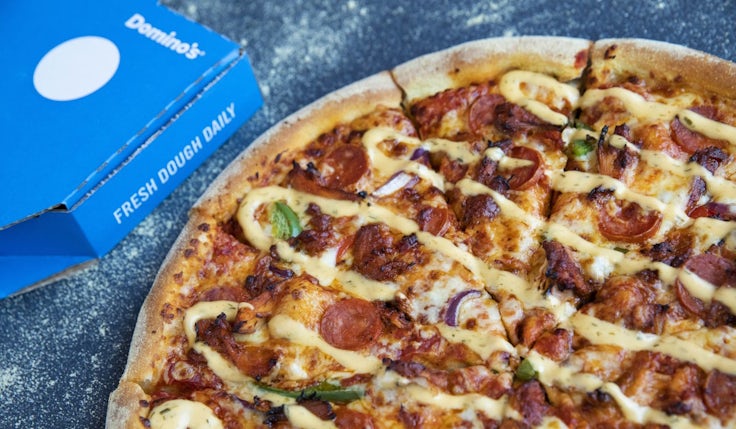 All Domino’s Pizza stores in Italy have now closed, having only launched in the country in 2015.
All Domino’s Pizza stores in Italy have now closed, having only launched in the country in 2015.
The US company failed to win over Italian customers, with falling sales, increased costs, debt and an increase in competition due to the growth of delivery services such as Just Eat and Deliveroo servicing local restaurants, according to the company’s bankruptcy filing in April this year.
The closure, first reported by Bloomberg, comes after Domino’s scaled back its Italian operations by stopping online delivery from 29 July.
The chain opened up in Italy through a franchising agreement with ePizza Spa, “borrowing heavily” with plans to open 880 stores in the country. An April tribunal in Milan granted the company court protection against creditors for 90 days, according to an ePizza filing, Bloomberg reports. At the end of 2020, the company had €10.6m (£8.9m) of debt.
Meanwhile, the UK arm of Domino’s said earlier this year that 2021 had been a “transformational” year for the company, as it announced it was increasing its marketing investment by £20m over three years, having appointed a new CMO in early 2021.
On franchises, the company said it had effectively reset its relationships to “unlock significant latent potential” and embrace a “a new era of collaboration, with the system working together more closely than ever before”.
READ MORE: Domino’s Pizza Quits Italy After Locals Shun American Pies
Heatwave hinders olive oil crops, with prices to rise 25%
The cost of olive oil is expected to increase as heatwaves impact crops in Spain, according to the BBC.
Exporter Acesur, which supplies the likes of Tesco, Morrisons and Asda, told the broadcaster that the production hit would feed through into prices in the next three to four months, when companies renew contracts.
This means customers may see prices rise by 20-25%. Acesur is involved in the production of more than 200,000 tonnes of olive oil a year, with Spain producing nearly half of the world’s olive oil.
The company’s export manager Miguel Colmenero told the BBC the impact of the heatwave was “drastic” and that dry weather this year could also impact next year’s crop.
Olive oil prices have already risen this year, up 14.2% in 12 months, according to market research company Mintec.
READ MORE: Olive oil prices to rise 25% as heatwave hits production
Lego celebrates 90th anniversary with ‘World Play Day’
Today marks 90 years of Lego and to celebrate the anniversary, the Lego Group is carrying out its first global ‘World Play Day’, with events and activities to encourage families and communities to “play more”.
Building on the company’s study, which found the majority of children (82%) wish they could play more, the group is encouraging children across the world to get involved.
The brand has paired up with the likes of Alicia Keys, Thierry Henry and Yotam Ottolenghi to create activations encouraging play, with in-person events including Lego Land takeovers and a new play space opening in West Harlem, New York.
Lego reopens its London Leicester Square store today, its largest store worldwide. The brand has also collaborated with Adidas to “bring play” to London, New York and Berlin with flagship store takeovers. The activations can also be found on Lego’s website and social media.
John Lewis boss says exodus of older workers fuelling wage inflation
The number of adults over-50 who left the workforce during the pandemic is fuelling wage inflation, according to John Lewis boss Dame Sharon White.
Any government must think “really hard” about getting older people back into work, she told the BBC. Since the pandemic began, 1 million people have left work – most of whom are in their 50s.
White says it “inevitably” causes wage inflation, speaking yesterday (9 August) on the BBC’s Today programme. Meanwhile, job vacancies are at a record high, with companies wanting to attract and retain staff and under pressure to increase pay, “which in turn fuels inflation”.
“Regardless of what has happened coming out of Covid, if the labour market is that tight, if we continue to have far fewer people in work [or] looking for work – you’ve inevitably got more inflation and more wage inflation,” said White.
READ MORE: John Lewis boss: Over-50s quitting the workforce fuels inflation
Tuesday, 9 August

Asda accused of ‘shaming poor families’ with new bright yellow budget range
Asda has been accused of “shaming poor families” by making the packaging of its new Just Essentials budget range bright yellow.
The supermarket has invested £45m in developing the range, which replaces its Smart Price products. It comprises 300 products including fresh meat, cupboard staples, bakery goods, frozen items and essential household and toiletry products.
Asda says it has been specifically designed to help families manage the rising cost of living. But the supermarket has come under fire as shoppers feel the bold packaging acts as a “poverty marker”.
According to the Metro, one shopper said the bright yellow branding screams “we are poor”, while another added it means “people on lower incomes should have a basket full of poverty markers”.
Asda has defended the new range, with a spokesperson stating: “We don’t understand why anyone would feel embarrassed for saving money and we are delighted by how much our customers are loving the new Just Essentials range, as shown by the great response and how they continue to add Just Essentials products to their basket every time they shop.”
READ MORE: Asda ‘shaming poor families’ by putting cheap food in bright yellow packaging
WhatsApp adds spate of privacy features backed by global marketing campaign
WhatsApp is set to introduce a series of new privacy features to help protect users, which will be supported by a global marketing campaign set to kick off in the UK and India this month.
The updates include the ability to exit groups without notifying everyone you are leaving. Just the admin will be notified. Users will also be able to control who can see when they’re online to enable people to check their WhatsApp privately. Both these features will be rolled out to users this month.
Elsewhere, WhatsApp is also going to block people from taking screenshots of ‘view once’ messages. This feature is currently being tested and will be rolled out “soon”.
WhatsApp’s existing privacy features include end-to-end encryption, block and report, two-step verification, end-to-end encrypted backups and disappearing messages.
To share the new features and educate users about the existing steps it has taken, WhatsApp is launching a global marketing campaign focused on message privacy and the various layers of protection it offers users. It focuses on the feeling of being protected when having private conversations.
Mark Zuckerberg, founder and CEO of WhatsApp owner Meta, says: “We’ll keep building new ways to protect your messages and keep them as private and secure as face-to-face conversations.”
Ami Vora, head of product at WhatsApp, adds: “At WhatsApp, we’re focused on building product features that empower people to have more control and privacy over their messages. Over the years, we’ve added interlocking layers of protection to help keep their conversations secure, and the new features is one way we continue to deliver on our commitment to keep messages private.”
Travelodge eyes expansion with £3bn plan for 127 London hotels
Travelodge is looking to extend its hotel footprint by 24% with plans to open 127 new sites in London alone, which could represent an investment of more than £3bn.
The budget chain is also looking to open a further 16 hotels in the North East. Combined this is likely to create around 6,400 new jobs.
It comes as Travelodge officially opens its first new-build “budget-luxe” hotels in London Docklands and Hexham in the north of England.
The low cost brand is looking to reposition its core product, with what it believes is a more premium look and feel, while maintaining its budget price point.
The TravelodgePlus format is based on the company’s largest consumer study of more than 5,000 business and leisure travellers to find out what is most important when on a budget.
Captain Morgan unveils ‘you do you’ global positioning
Diageo rum brand Captain Morgan has unveiled a new global positioning that celebrates self expression and a “you do you” attitude.
The first instalment of the ‘Spice On’ campaign, which is voiced by chef and MC Big Zuu, focuses on people having fun and expressing their individuality. In one scene, a girl is seen dipping a chicken wing into her Captain Morgan and cola, while in another a man adds ice cream to his to make a Captain and cola float.
Created by Anomaly, the ad will launch in Great Britain this month before being rolled out across Europe. It will run on social, digital and TV.
Samori Gambrah, global brand director, Captain Morgan, says: “‘Spice’ is what makes Captain Morgan delicious, and in our new global positioning we’re shifting the focus to spice as a collective ‘you do you’ attitude.
“We wanted this campaign to capture that everyone has their own spice to bring. Big Zuu was the perfect partner to kick things off – his attitude, personality and passion for flavour exudes spice at every turn.”
Bodyform owner appoints new marketing director
Essity, the owner of brands including Bodyform, Tena and Cushelle, has hired Ruth Gresty as marketing director for consumer goods in the UK and Republic of Ireland.
She joins from agency Boxed Red where she was managing director and will work across the hygiene and health business’s key consumer good brands, which also include Velvet and Plenty.
Gresty has more than two decades of marketing experience, having started her career as an assistant brand manager at SSL International, now Reckitt, working across brands including Durex. She also spent five years at Kellogg’s as a marketing manager before joining Spectrum Brands as UK and Ireland marketing director in 2017.
She takes over from Nicola Coronado, Essity’s former regional marketing director has is now business strategy director for ecommerce and marketing, consumer goods. Her remit is to identify current and future opportunities with a focus on ecommerce.
Elsewhere, Sarah Wilson has been promoted to vice-president of communications for consumer goods within the global consumer goods team and Gareth Lucy has been promoted to UK and ROI communications director, starting on 1 September.
Monday, 8 August
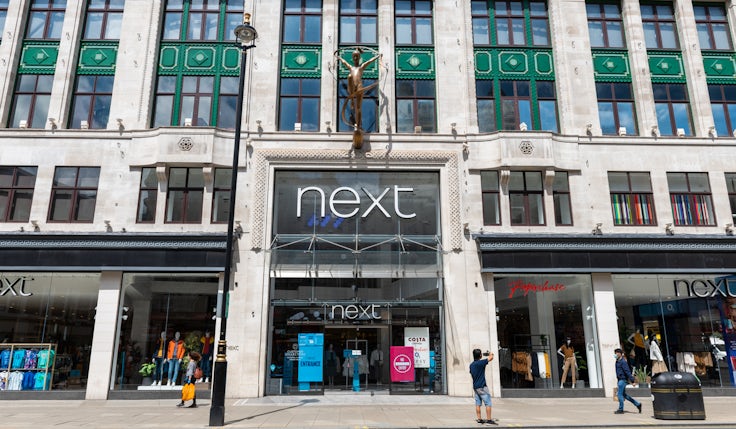 Next launches bid for 25% stake in Joules
Next launches bid for 25% stake in Joules
Next is reportedly looking to acquire a 25% stake in Joules, adding the ailing fashion and lifestyle brand to its wider portfolio.
According to Sky News, Next has been in negotiations for weeks to seal the deal, although it is understood the completion of the purchase could still be weeks away.
Spanning 130 stores and employing more than 1,000 people, Joules has recently hired accountancy firm KPMG to help improve its profitability as the chain has suffered amid the pressures of inflation.
Over the past year Joules has seen its valuation fall by close to 90%, meaning at current levels Next would have to pay around £10m for a 25% stake in the business, Sky News reports.
The high street retailer has a track record of adding well known brands to its portfolio. In 2020, Next acquired a majority stake in the UK arm of Victoria’s Secret in a joint venture arrangement, after the lingerie business went into administration following Covid-enforced store closures.
Last year Next took a 25% stake in premium fashion brand Reiss at a cost of £33m. As part of the deal, Reiss’s online operations are contracted to Next, which also provides warehouse and distribution services as part of its Total Platform offering.
Then in April, the retailer joined forces with a group of investment firms to purchase baby clothing and maternity wear brand JoJo Maman Bébé.
Beyond its acquisition strategy, it was revealed this weekend Next is being investigated by HMRC to ensure the retailer is paying staff the national minimum wage, after workers were left unpaid following the rollout of a new payroll system. The investigation will span the company’s entire corporate structure and subsidiaries.
The Sunday Times reports that last year Next discovered it had inadvertently over-claimed furlough money by more than £7m, which has since been repaid, while failing to make furlough payments of around £2m to 4,000 employees. While staff who remain with the business have since been paid, around 900 workers who left the business are reportedly still to receive the money.
READ MORE: Next swoops for stake in struggling lifestyle retailer Joules
Data regulator to probe ad tracking in online gambling
The Information Commissioner’s Office (ICO) is to investigate tracking tech used by gambling brand Sky Bet, following allegations the firm is creating “detailed behavioural profiles” of users.
According to a complaint made by campaign group Clean Up Gambling, Sky Bet is alleged to be sharing “thousands of data points with dozens of third parties” to persuade gamblers to win their losses back, the Financial Times reports. Most tracking is reportedly conducted “ostensibly to monitor for dangerous play” to prevent users exceeding their limits.
Clean Up Gambling is calling for an urgent audit of the whole online gambling industry, which it alleges uses similar strategies, as well as the ad tech companies providing the technology and data brokers.
The Financial Times reports that one of Sky Bet’s advertising partners Signal, owned by credit reporting company TransUnion, held a “dossier of 186 attributes for an individual”, which included their propensity to gamble, favourite games and susceptibility to different forms of marketing.
Clean Up Gambling director Matt Zarb-Cousin describes this behaviour as the “sharp end of data abuse”.
In a statement Flutter, the parent company behind Sky Bet, Paddy Power and Betfair, told the Financial Times protecting customers’ personal data is of “paramount importance” and it expects the “same levels of care and vigilance” from its partners.
The gambling mega group said all its companies manage customer data in a “controlled way” in order to “proactively protect” users from harm, adding that it works with third parties to ensure vulnerable customers are not targeted with sponsored social ads.
According to statistics from the UK Gambling Commission, cited by the Financial Times, the UK gambling industry is worth £12.7bn, with online casino games representing a 31.7% share of the gross gambling yield. Online betting claims a 20.9% of the gross yield, with in-store betting at an 8.2% share, suggesting the growing popularity of online gambling following the Covid-enforced closure of high street bookies.
Furthermore, the gambling industry splashes out a reported £1.5bn on advertising a year, with 60% of profits coming from just 5% of users, according to parliamentary data.
READ MORE: Ad tracking by online gambling industry comes under scrutiny (£)
Musk accuses Twitter of deliberately ‘miscounting’ spam accounts
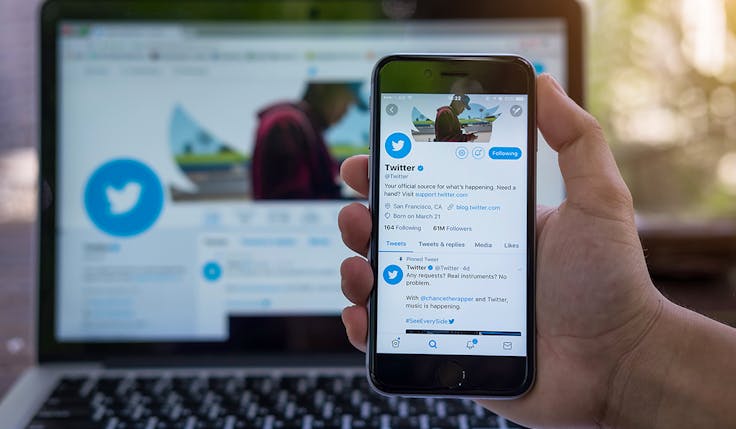 Elon Musk has accused Twitter of deliberately “miscounting” the scale of spam accounts on its platform in order to mislead investors.
Elon Musk has accused Twitter of deliberately “miscounting” the scale of spam accounts on its platform in order to mislead investors.
The Tesla CEO alleges the social media giant chooses to miscount the number of fake users as part of a “scheme to mislead investors about the company’s prospects”, the Guardian reports.
The scale of fake accounts was the reason Musk first put his acquisition of the social platform on hold in May, when he informed his 102.8 million Twitter followers the deal was paused pending proof bots represent “less than 5% of users”.
Twitter has stuck by the figure that fake users account for less than 5% of its 238 million strong user base. However, Musk claims the social media company has “overstated” the scale of daily active users who see ads, a number he alleges is in fact 65 million lower than reported.
Musk is countersuing Twitter, which last month took him to court to force him to complete the $44bn (£36.5bn) takeover agreed back in April. In the lawsuit, his lawyers claim figures provided to US financial watchdog are “inaccurate and have distorted the value” of the company.
Furthermore, the Tesla boss alleges “numerous, material misrepresentations or omissions” were made to “distort” Twitter’s value and cause the deal to be struck at an “inflated price”. The lawsuit also calls out what Musk sees as “personal attacks” in Twitter’s legal documents.
The Twitter lawsuit, filed in July, claims Musk “mounted a public spectacle” to put the deal in play, suggesting he now wants to pull out as Tesla’s value has declined in recent months. The social media giant also says Musk’s earlier allegations have “cast a pall over Twitter and its business”.
In response to the latest claims, Twitter describes Musk’s arguments for abandoning the deal as “a story, imagined in an effort to escape a merger agreement” he no longer finds attractive, due in part to a “decline” in his “massive personal wealth”. Twitter’s case against Musk comes to court in October.
READ MORE: Musk accuses Twitter of deliberately miscounting spam users in countersuit
Amazon inks $1.7bn takeover of home tech maker iRobot
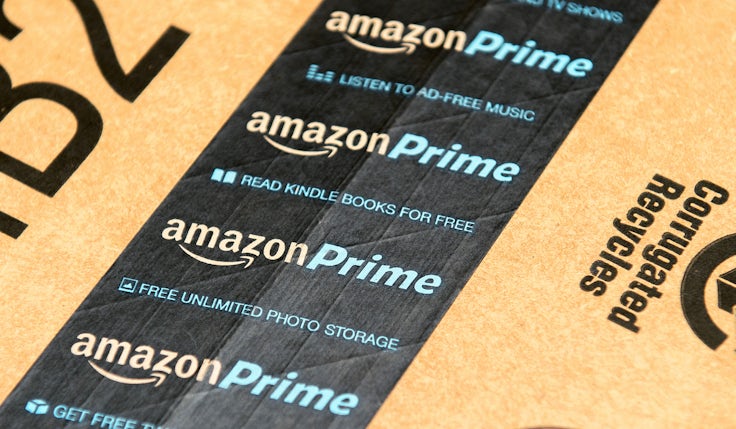 Amazon is splashing out $1.7bn (£1.4bn) to buy smart home tech manufacturer iRobot, as the ecommerce giant continues to use acquisitions to expand beyond its retail heartland.
Amazon is splashing out $1.7bn (£1.4bn) to buy smart home tech manufacturer iRobot, as the ecommerce giant continues to use acquisitions to expand beyond its retail heartland.
Describing itself as a “global consumer robot company”, iRobot is best known for its Roomba circular robot vacuum designed to integrate with smart home tech. Launched in 2002, the Roomba varies in price from £269 to £1,299. The US-based company claims to design and build “thoughtful robots and intelligent home innovations”, with a product portfolio spanning “advanced concepts” in cleaning, mapping and navigation.
However, on Friday iRobot reported its intention to cut 10% of its workforce, as revenues fell 30% during its latest quarter following order reductions and delays, the Guardian reports.
Despite the wobble in revenue, senior vice-president of Amazon Devices Dave Limp credits iRobot with having “proven its ability to reinvent” how people clean.
Amazon hopes iRobot’s products will fit alongside the likes of AI assistant Alexa and doorbell camera product Ring, the latter acquired by the ecommerce giant for $1bn in 2018.
The purchase of iRobot is not Amazon’s first foray into robot tech. In September 2021, the company first began to publicise the launch of its Astro home robot, pitched as a helper around the home.
Astro is designed to roam autonomously around the house when the owners are out to check on specific areas and offer live views of rooms through the app. The robot can also be linked with Alexa and follow users around the house playing TV programmes, podcasts or music. The robot launched earlier this year at an invite-only price of $1,000, which is expected to rise to $1,450 on general release.
Amazon’s growing presence in the smart home market is, however, a source of concern to groups pushing for stricter antitrust regulations in the US, which argue the iRobot merger should be blocked.
READ MORE: Amazon agrees to buy Roomba maker iRobot for $1.7bn
Food prices surge in June amid drought fears
Food prices surged by 11.5% in June, the fifth consecutive month of double-digit inflation according to the latest NielsenIQ Prestige Foodservice Price Index.
All 10 food and drink categories covered in the index moved upwards year on year, with fruit, dairy and oils and fats recording inflation of more than 20%. According to the index, several categories surged month on month as the impact of Russia’s invasion of Ukraine continued to have an effect on the price of key commodities.
Food prices were also being driven up by concerns over the prospect of drought in several areas of the UK following the recent heatwave. Fears farmers could be banned from watering crops this month and next, coupled with shortages of seasonal labour and poor grass quality, is taking its toll on the industry.
Client director NielsenIQ James Ashurst describes drought as the latest in a “very long line of threats” to global foodservice supply, meaning inflation is likely to remain high for some time to come.
“With consumers as well as businesses feeling a tightening squeeze on their spending, the outlook for all food and drink businesses remains challenging,” he adds.
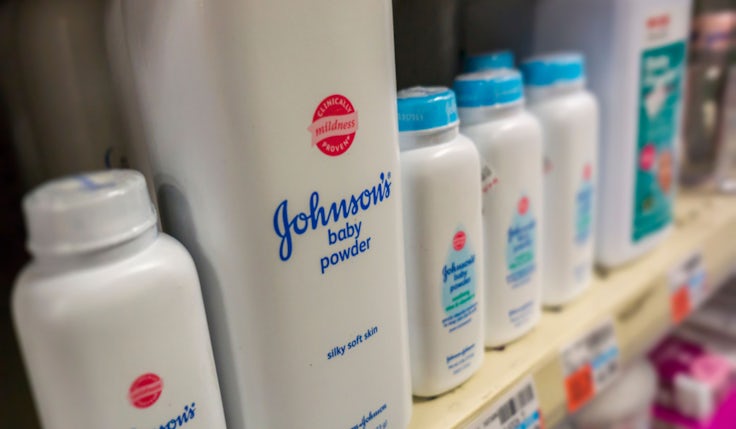

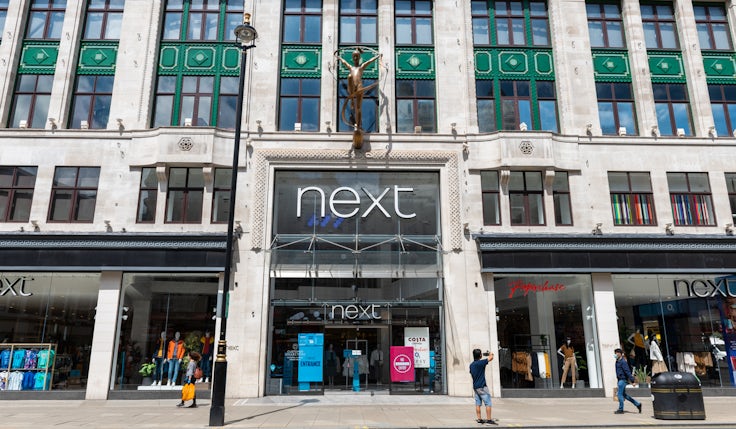 Next launches bid for 25% stake in Joules
Next launches bid for 25% stake in Joules






Comments